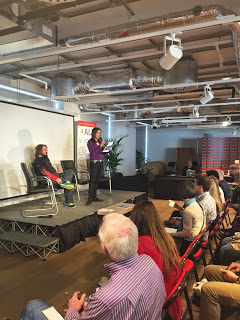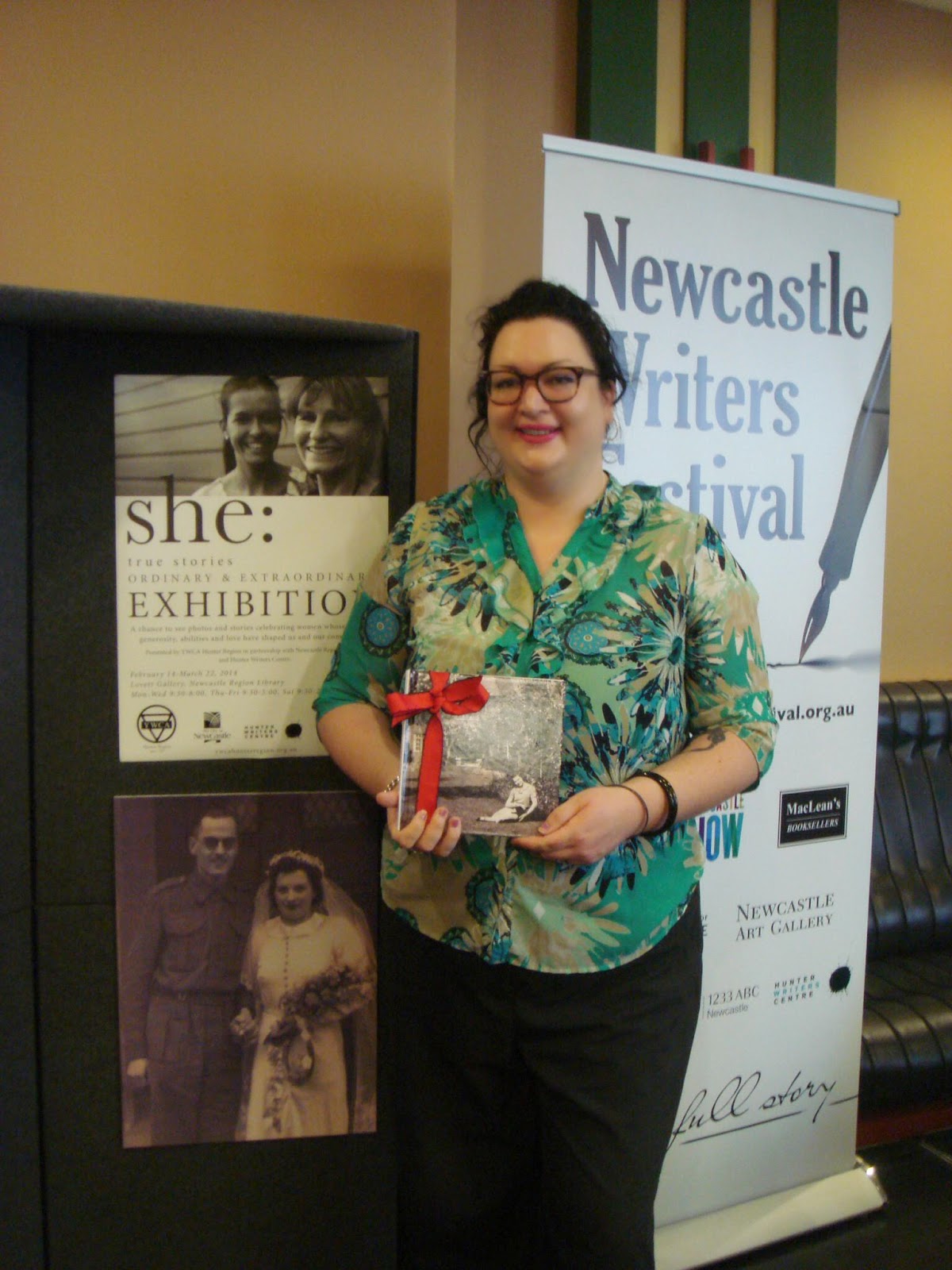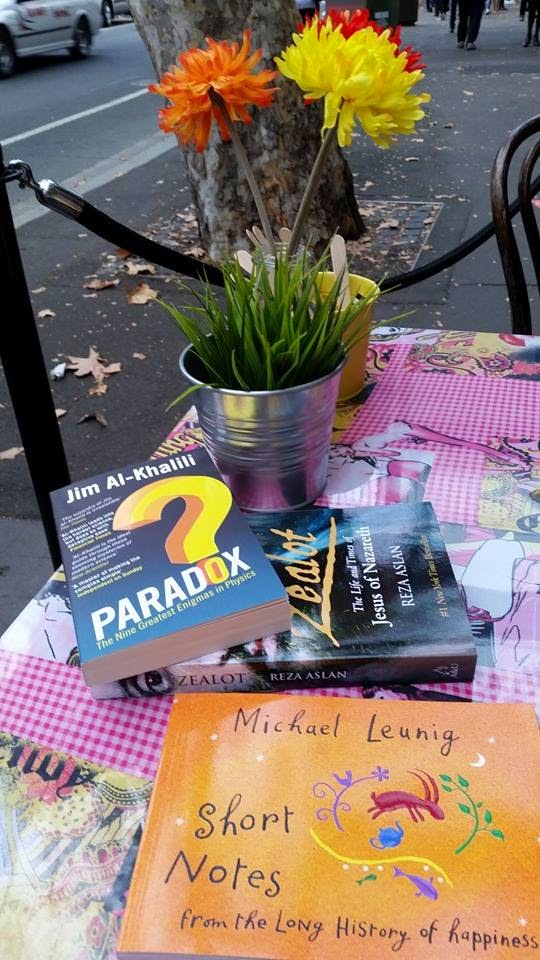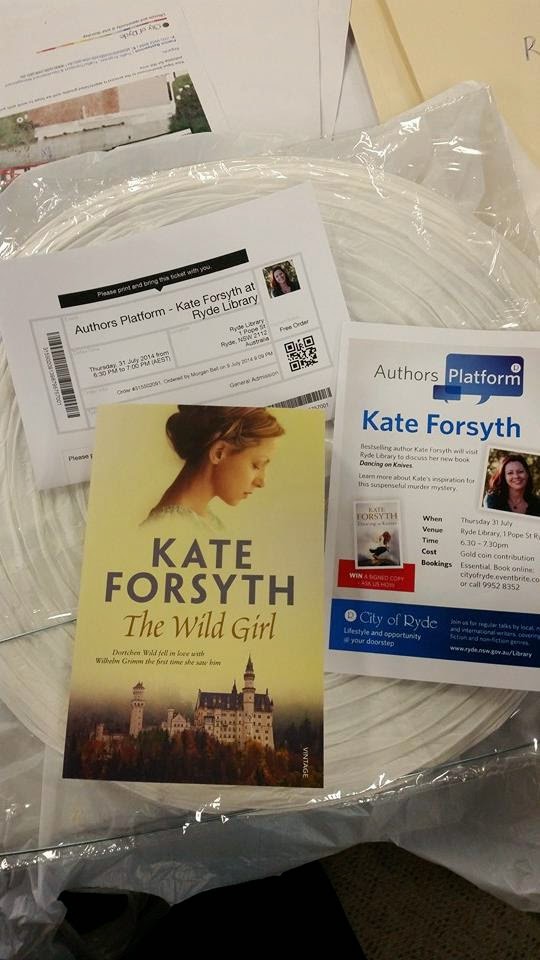 |
| Audience held captive by Rohan |
For those of you not lucky enough to have attended the event, with permission from the authors, we'd like to give you a taste of their presentation.
Starting with the beautiful poem 'Because' which was narrated by its author, Dan Holloway.
“Because”
Because every day a little girl, let’s call her Sarah,
Hears the world condensed into words
And falls in love with a possibility.
That she might fold her life into a gift of syllables and sentences
And hold it out
For all the sisters, misfits, lonely souls and drifters
And hold it out
For all the sisters, misfits, lonely souls and drifters
To open and unfold towards a beautiful horizon they’d always thought hopelessly distant.
Because her parents see the way she looks and sigh
And go to bed and cry because they know
Tomorrow they take Sarah to a place every other child she knows believes is magic -
A bookshop.
And go to bed and cry because they know
Tomorrow they take Sarah to a place every other child she knows believes is magic -
A bookshop.
Because they know when she reaches her beautiful black hands to the mirror of the shelf
Instead of herself
She sees my white hands reflected back
Instead of herself
She sees my white hands reflected back
Because tomorrow’s books are written by the choices we make today
Their pages penned by voices we invite to stay
And voices that we cast away.
Their pages penned by voices we invite to stay
And voices that we cast away.
Because when we set your sights on our own freedom
The light you see at the end of the tunnel is just a metaphor
Systemically generated by the literary hegemony
To strengthen the advantages of an already charmed existence
To keep others at arm’s length and their chances at a manageable distance
The light you see at the end of the tunnel is just a metaphor
Systemically generated by the literary hegemony
To strengthen the advantages of an already charmed existence
To keep others at arm’s length and their chances at a manageable distance
Because what we call quality others call colony
Whose overlords behead the aspirations of others
With ceremonial swords
Of approving badges, nodding column inches, blogging and awards.
Whose overlords behead the aspirations of others
With ceremonial swords
Of approving badges, nodding column inches, blogging and awards.
Because when we pick and choose the facts of writing right,
Dictate the tropes and tools of narrative exactitude
So Sarah loses if she enacts her life
Maybe the syntax we use is wrong.
Because if we want to uncage every song
Be fibres of a fabric where every thread belongs
It is our duty to take this microphone
And these tweets
And empty them of middle-aged white guys like me.
To hold the door as I withdraw
And Sarah takes the floor,
And unrolls a carpet woven with the warp of her words and the weft of her dreams
And waits with open pages
Dictate the tropes and tools of narrative exactitude
So Sarah loses if she enacts her life
Maybe the syntax we use is wrong.
Because if we want to uncage every song
Be fibres of a fabric where every thread belongs
It is our duty to take this microphone
And these tweets
And empty them of middle-aged white guys like me.
To hold the door as I withdraw
And Sarah takes the floor,
And unrolls a carpet woven with the warp of her words and the weft of her dreams
And waits with open pages
For all the sisters, misfits, lonely souls and drifters
As their lives unfold towards the heart-lifting, dream-shifting, gloriously glittering stage.
As their lives unfold towards the heart-lifting, dream-shifting, gloriously glittering stage.
And secondly, Rohan's talk on the need to protect literary fiction and poetry in today's mass media, instant access, market.
“Should Literary Fiction & Poetry Be Protected?”
This is an exciting era, with new digital possibilities opening up every month, it seems. And that’s fabulous. It sometimes feels as if we’re hardly in control of those developments - and that in itself is fun, and it’s probably good for us too. But we can still influence a few things, to some extent, sometimes. Which means it’s incumbent on us to try to do so, if we can discern a way of steering those things for the better - such as making sure this brave new publishing arena is fully on view and celebrated in all its variety. So here’s a question, just to throw into the mix.
This is an exciting era, with new digital possibilities opening up every month, it seems. And that’s fabulous. It sometimes feels as if we’re hardly in control of those developments - and that in itself is fun, and it’s probably good for us too. But we can still influence a few things, to some extent, sometimes. Which means it’s incumbent on us to try to do so, if we can discern a way of steering those things for the better - such as making sure this brave new publishing arena is fully on view and celebrated in all its variety. So here’s a question, just to throw into the mix.
One characteristic of this era is that secret and mysterious non-human algorithms increasingly act as virtuous spirals of market power, perhaps more than ever before. But let’s stand back from those less-human processes and consider an equally important, wider question. That question is: how can we ensure the longer-term good health (financial and cultural) of a sector of human endeavour whose richness and interest depend on the flourishing of a diversity of fiction categories, and not just the handful of categories that happen to sell at the highest volume? Solving this would benefit many electrifying writers whose voices would otherwise go unheard; but more importantly, it would also benefit readers and the wider culture.
It goes without saying that all fiction categories are created equal in themselves, with equal value and loveliness. But in both independent and traditional publishing these days, titles in literary and cross-genre categories are under more pressure than ever to justify their existence in terms of purely commercial competition with more mass-market genres. Pure market forces are fine, as far as they go. But they do seem to be this digital dynamic’s main source of oxygen, so far; and their nature just happens to ensure that only certain kinds of content tend to get organically promoted, for any given level of time or effort or money that’s available to be expended. And those kinds of content are all fine and beautiful in themselves (just as much as the more literary fiction categories); but the resultant incompleteness in the picture of the kinds of creative output that are really being published is something that should be revealed and addressed.
It’s often lamented that the variety and quirkiness of places like London’s Soho and Downtown Manhattan have suffered a big diminishment in recent years, as unique venues have been priced out and pushed out by well-lit, well-heated new branches of favourite high-street chain-stores that are already popular and well-trafficked everywhere else too. Echoing that gentrification process, the combination of retail algorithms and the media’s frequent focus on sales-oriented reporting tends to cause commercial fiction categories (beautiful as those are) to push literary fiction categories out of comparable visibility, to a greater extent in independent publishing than in traditional publishing. This is not the fault of commercial fiction authors themselves - of course not. But in any field, if certain categories of activity in that field have a tendency to end up effectively hidden from general view, then the landscape of that field starts looking quite a bit less richly varied than it really is. Unnecessarily so: this doesn’t need to be the case, if we put our heads together to address it.
Many a Starbucks branch has displaced many an indie coffee-shop. Both make equally excellent coffees and both are equally attractive in their own different ways. But what shall we and the media come up with, in order to make sure that the fiction-category equivalents of the small indie coffee-shop - e.g. literary fiction (including its more envelope-pushing varieties, but not only these) - can remain commercially viable, alongside the Starbucks-level profits that more commercial categories of fiction are already smartly achieving through indie publishing? New organisations, new coalitions, perhaps? All fiction categories are created equal; but in this current exciting era some categories tend to get edged out of visibility, in independent publishing at least, in favour of other ones. And this edging-out is a powerful shaper of the culture: so prevalent, that it’s able to hide in plain view, like an elephant in a room. Dan and I would therefore like to shine a light on this elephant! (It’s over there…)
I’ll close by saying that in urban planning, clever zoning innovations are sometimes introduced, to preserve or adapt the character of a retail district, in order to maintain its variety (but without being too restrictive on businesses large or small). Is some media equivalent of such zoning possible here? These innovations must surely be achievable … and they must be achieved, proactively. We just haven’t found them yet. So let’s find them!
I’ll close by saying that in urban planning, clever zoning innovations are sometimes introduced, to preserve or adapt the character of a retail district, in order to maintain its variety (but without being too restrictive on businesses large or small). Is some media equivalent of such zoning possible here? These innovations must surely be achievable … and they must be achieved, proactively. We just haven’t found them yet. So let’s find them!















